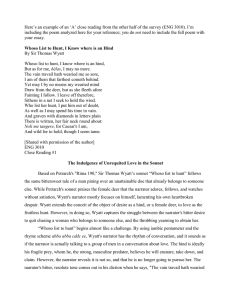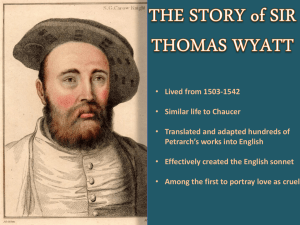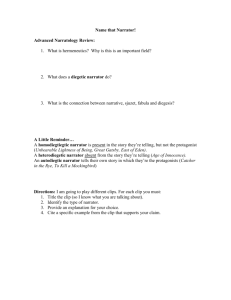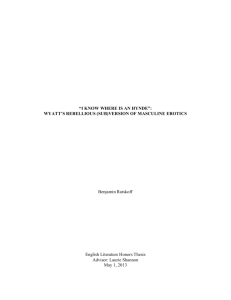Sample Close Reading
advertisement
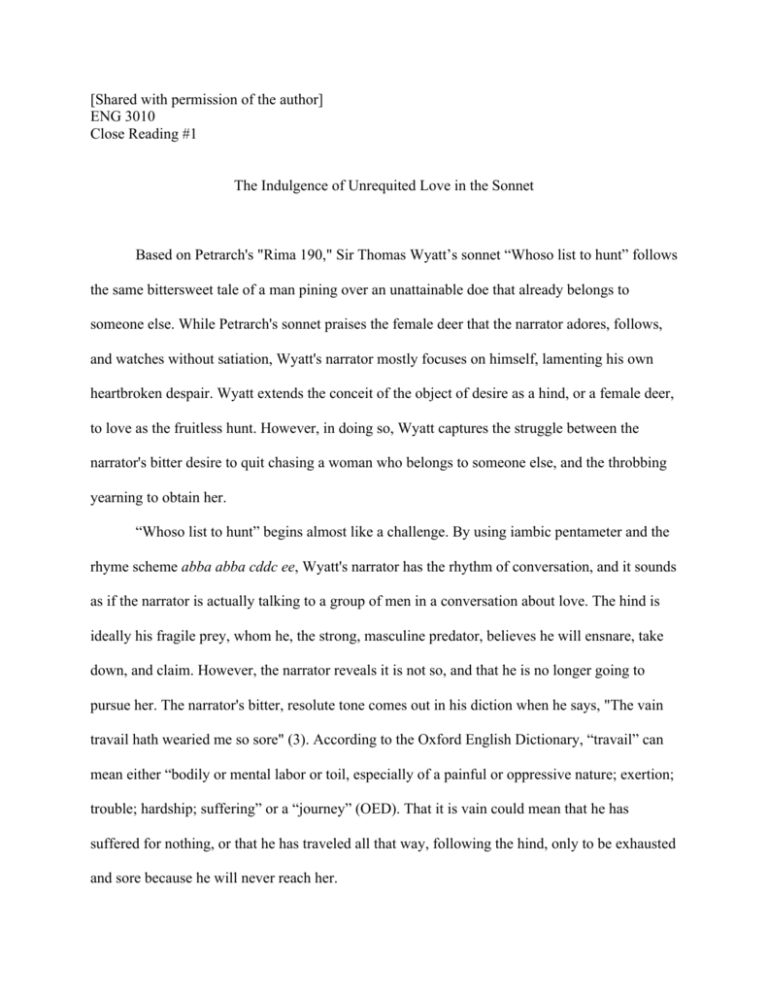
[Shared with permission of the author] ENG 3010 Close Reading #1 The Indulgence of Unrequited Love in the Sonnet Based on Petrarch's "Rima 190," Sir Thomas Wyatt’s sonnet “Whoso list to hunt” follows the same bittersweet tale of a man pining over an unattainable doe that already belongs to someone else. While Petrarch's sonnet praises the female deer that the narrator adores, follows, and watches without satiation, Wyatt's narrator mostly focuses on himself, lamenting his own heartbroken despair. Wyatt extends the conceit of the object of desire as a hind, or a female deer, to love as the fruitless hunt. However, in doing so, Wyatt captures the struggle between the narrator's bitter desire to quit chasing a woman who belongs to someone else, and the throbbing yearning to obtain her. “Whoso list to hunt” begins almost like a challenge. By using iambic pentameter and the rhyme scheme abba abba cddc ee, Wyatt's narrator has the rhythm of conversation, and it sounds as if the narrator is actually talking to a group of men in a conversation about love. The hind is ideally his fragile prey, whom he, the strong, masculine predator, believes he will ensnare, take down, and claim. However, the narrator reveals it is not so, and that he is no longer going to pursue her. The narrator's bitter, resolute tone comes out in his diction when he says, "The vain travail hath wearied me so sore" (3). According to the Oxford English Dictionary, “travail” can mean either “bodily or mental labor or toil, especially of a painful or oppressive nature; exertion; trouble; hardship; suffering” or a “journey” (OED). That it is vain could mean that he has suffered for nothing, or that he has traveled all that way, following the hind, only to be exhausted and sore because he will never reach her. The narrator's despondency continues when he almost complains, "I am of them that farthest cometh behind" (4). This line implies that there are multiple other suitors he is competing with as well, and yet he is not fast enough to keep up with them. This makes one wonder if perhaps he is not putting in as much effort, and wallowing in sadness instead. He even repeats the word "wearied" in line 5, this time as an adjective to describe his fatigued, dissatisfied mental state. However, the conflict in the narrator's logic soon reveals itself. Like in Petrarch's "Rima 190," when the doe flees, both men follow her, but it is crucial that Wyatt adds the word "fainting" in “fainting I follow” (7). Fainting can either mean becoming “feeble or faint-hearted; depressed; discouraged” or “swooning” (OED). If we read fainting to mean that the narrator halfheartedly, sorrowfully follows his love, it seems as if he will soon give up on her, and but when we read fainting as swooning over her, there is still a romance that he is not ready to give up. This sentence strangely cuts off in the middle of the line, disrupting the rhythm and giving the reader a break to pause. This is the point where the narrator is between his decision to quit the chase and to keep on. Indeed, the next sentence in the middle of line 7 claims that the narrator is leaving the chase, and he describes his futile, frustrating attempt to capture her as if “in a net I seek to hold the wind” (8). He appears to be disillusioned of following her, and it is not exciting to him any longer. However, to describe his love as the intangible, unattainable “wind,” gives the imagery of a beautiful force of nature that completely surrounds him. He breathes her in; he feels her breeze on his cheek. Wind is everywhere, and wind is always there, and he cannot escape her so easily. At line 9, Wyatt places the Petrarchan volta, or the turning point, where he restates the first line “whoso list to hunt” (1) as “who list her hunt” (9). Whereas “whoso” and “to hunt” are broad and includes whoever wants to join, Wyatt gets much more specific with “who” and “her hunt.” It is almost as if he is offering advice to an intimate friend, to prevent yet another man from getting his heart broken, and also as if he is boasting that nobody else can ever catch her. Finally, when describing the hind, Wyatt describes her with “graven with diamonds in letters” (11) around “her fair neck” (12). They say, “Noli me tangere, for Caesar’s I am/ And wild for to hold, though I seem tame” (13-14). We get the imagery of the hind as elusive, beautiful, and wild. These words around her neck, although she does not speak, give the hind a voice, and she is literally untouchable, as if she is ethereal and not of this earth. The final line eradicates the perception of the tamed, weak prey in love. This woman is wild to hold and dangerous, which suggests that she belongs to no one, not even Caesar. Although Petrarch's Rima 190 and "Whoso list to hunt" are both love poems, the inner turmoil of the narrator is present in Sir Thomas Wyatt's twelve-line sonnet. He indulges and languishes in his misery, rather than appreciating the tiny glimpse of the doe like Petrarch does. If this poem is truly about Anne Boleyn and Caesar is King Henry VIII, perhaps Wyatt resolves his heartbroken resentment and his simultaneous longing, by refusing to acknowledge their happy ending at all. If Wyatt can't have her, no one can. OED. "Fainting." Oxford English Dictionary, Web. 25 Feb. 2014. http://www.oed.com.remote.baruch.cuny.edu/view/Entry/67688?rskey=mujXbW&result=1&isA dvanced=false#eid. OED. "Travail." Oxford English Dictionary, Web. 25 Feb. 2014. http://www.oed.com.remote.baruch.cuny.edu/view/Entry/205252?rskey=Yut6Zx&result=1&isA dvanced=false#eid. Wyatt, Sir Thomas. "Whoso List to Hunt." The Norton Anthology of English Literature. Ed. Stephan Greenblatt. 9th ed. Vol. B. New York, NY: W. W. Norton &, 2012. 649. Print.
